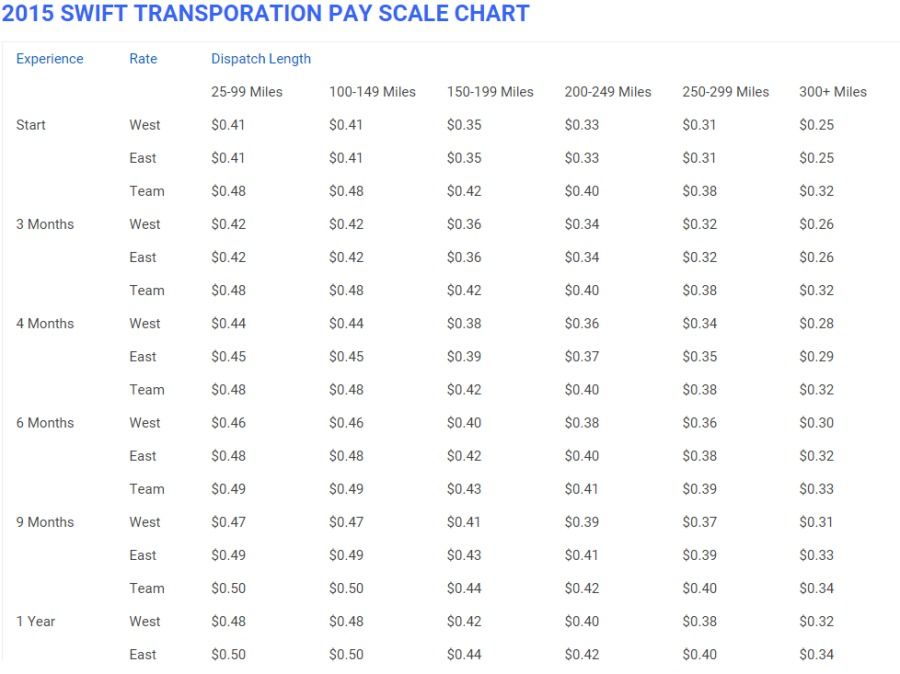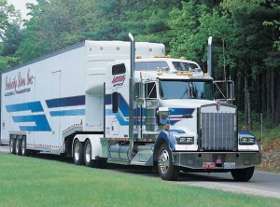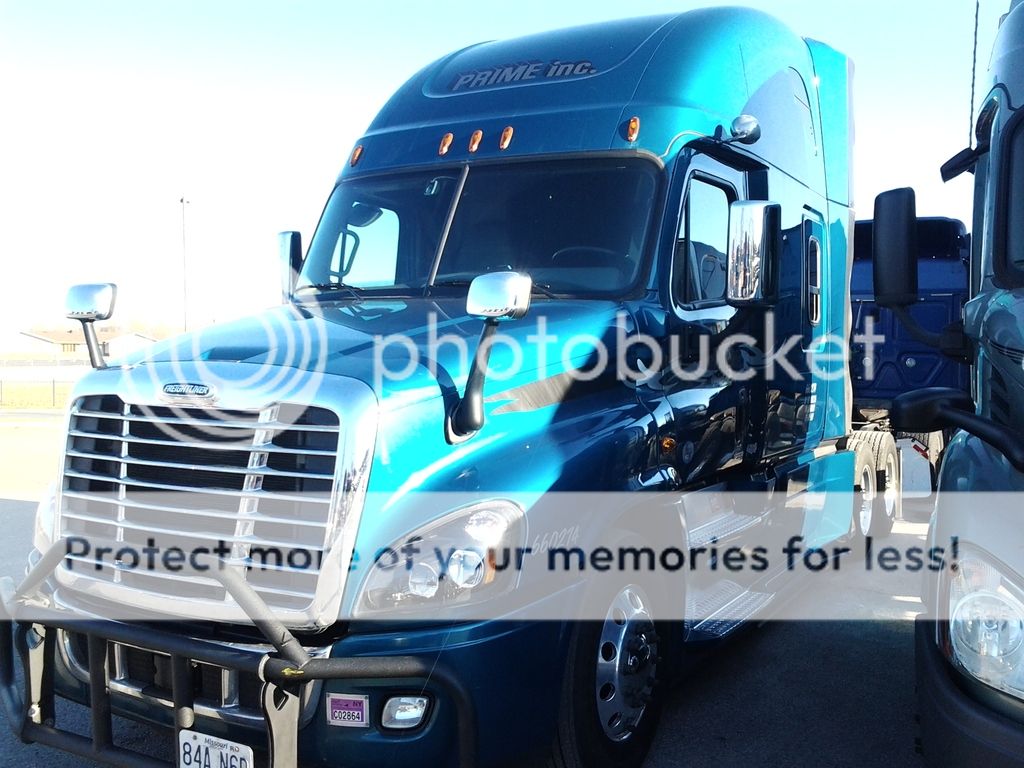Swift Vs. Prime: The Battle For Supremacy.
Topic 10593 | Page 3
I didn't receive a Private message.

To contact a recruiter at prime, here's an email for my recruiter, she was really good.
babrown@driveforprime.com
the reason i went with prime is cause they pay you $200 per week while you are in CDL training i don't know who else is doing that.
i have no interest in getting any financial compensation for giving you this info, i am also not eligible for it since i do not drive for prime, but i trained there.
CDL:
Commercial Driver's License (CDL)
A CDL is required to drive any of the following vehicles:
- Any combination of vehicles with a gross combined weight rating (GCWR) of 26,001 or more pounds, providing the gross vehicle weight rating (GVWR) of the vehicle being towed is in excess of 10,000 pounds.
- Any single vehicle with a GVWR of 26,001 or more pounds, or any such vehicle towing another not in excess of 10,000 pounds.
- Any vehicle, regardless of size, designed to transport 16 or more persons, including the driver.
- Any vehicle required by federal regulations to be placarded while transporting hazardous materials.

Swift is a bigger company, has more dedicated accounts and more options for different freight in general. Prime pays more and seems to have more flatbed if thats your thing.
If you are considering Swift you might want to check out Schneider as well.

Swifts pays less than prime. 

To contact a recruiter at prime, here's an email for my recruiter, she was really good.
babrown@driveforprime.com
here's the number
http://www.primeinc.com/
the reason i went with prime is cause they pay you 200 per week while you are in CDL training i don't know who else is doing that.
i have no interest in getting any financial compensation for giving you this info, i am also not eligible for it since i do not drive for prime, but i trained there.
The $200 a week is a loan. After you start the TNT phase $25 a week is withheld from your check until it is paid back. For me I ended up paying back $1000 dollars. During the TNT phase I have grossed over $800 per check just to give an idea of what you can expect if you chose Prime.
CDL:
Commercial Driver's License (CDL)
A CDL is required to drive any of the following vehicles:
- Any combination of vehicles with a gross combined weight rating (GCWR) of 26,001 or more pounds, providing the gross vehicle weight rating (GVWR) of the vehicle being towed is in excess of 10,000 pounds.
- Any single vehicle with a GVWR of 26,001 or more pounds, or any such vehicle towing another not in excess of 10,000 pounds.
- Any vehicle, regardless of size, designed to transport 16 or more persons, including the driver.
- Any vehicle required by federal regulations to be placarded while transporting hazardous materials.
HOS:
Hours Of Service
HOS refers to the logbook hours of service regulations.TNT:
Trainer-N-Trainee
Prime Inc has their own CDL training program and it's divided into two phases - PSD and TNT.
The PSD (Prime Student Driver) phase is where you'll get your permit and then go on the road for 10,000 miles with a trainer. When you come back you'll get your CDL license and enter the TNT phase.
The TNT phase is the second phase of training where you'll go on the road with an experienced driver for 30,000 miles of team driving. You'll receive 14¢ per mile ($700 per week guaranteed) during this phase. Once you're finished with TNT training you will be assigned a truck to run solo.
When you're choosing a company the first things you have to decide are what type of freight you'd like to haul and how often you'd like to get home.
As far as the types of freight available, both Swift and Prime have a ton of options. Swift has nearly everything - dry van , refrigerated, flatbed, intermodal , and all sorts of various dedicated fleets. Prime has a ton of stuff too - refrigerated, flatbed, and food grade tanker.
As far as home time, Swift will likely have far better options than Prime. Prime is mostly OTR so on average you're out 3 to 4 weeks and home 3 to 4 days. Swift will have options for home every night, home weekends, or of course you can run OTR. Some of those various options may require putting in a few months time before they become available.
After that you want to look at pay. Prime pays a little bit better than Swift but it's not so much more that it should be the only deciding factor.
Another one to look at is equipment. Both companies have outstanding equipment. The only thing to note is that you may wind up in a lightweight truck at Prime which has quite a bit less room in it than a full size truck but they will pay you better to compensate for that. Daniel B, one of our moderators and a trainer at Prime, says you can get a full size truck if you have a solid reason for needing it - like maybe you want to have a passenger along with you.
One final thing to consider is where you'll be running. It's more likely you'll cover more of the country with Prime than you will with Swift. Swift will tend to keep you in a certain region of the country more often where with Prime you will likely get the opportunity to see most of the 48 states at some point, though you will spend the majority of your time toward the Eastern half of the country.
Really both companies are outstanding. This is a great choice to have. For me personally the choice between those two would likely come down to the home time I wanted, the possibility of getting assigned a lightweight truck, and which regions of the country I wanted to travel. If you want to get home more often and stay in a particular region of the country, Swift is the way to go. If you want to stay out longer and see a greater portion of the country, Prime is the way to go. You may or may not care much about the lightweight truck. I personally would much prefer the larger truck but I don't know if I would avoid Prime just for that reason.
Here are some more resources for you:
Category Of Articles: Finding The Right Truck Driving Job
Career Guide Chapter 5: Choosing Your First Truck Driving Job
CDL:
Commercial Driver's License (CDL)
A CDL is required to drive any of the following vehicles:
- Any combination of vehicles with a gross combined weight rating (GCWR) of 26,001 or more pounds, providing the gross vehicle weight rating (GVWR) of the vehicle being towed is in excess of 10,000 pounds.
- Any single vehicle with a GVWR of 26,001 or more pounds, or any such vehicle towing another not in excess of 10,000 pounds.
- Any vehicle, regardless of size, designed to transport 16 or more persons, including the driver.
- Any vehicle required by federal regulations to be placarded while transporting hazardous materials.
OTR:
Over The Road
OTR driving normally means you'll be hauling freight to various customers throughout your company's hauling region. It often entails being gone from home for two to three weeks at a time.
Intermodal:
Transporting freight using two or more transportation modes. An example would be freight that is moved by truck from the shipper's dock to the rail yard, then placed on a train to the next rail yard, and finally returned to a truck for delivery to the receiving customer.
In trucking when you hear someone refer to an intermodal job they're normally talking about hauling shipping containers to and from the shipyards and railyards.
Dry Van:
A trailer or truck that that requires no special attention, such as refrigeration, that hauls regular palletted, boxed, or floor-loaded freight. The most common type of trailer in trucking.HOS:
Hours Of Service
HOS refers to the logbook hours of service regulations.OOS:
When a violation by either a driver or company is confirmed, an out-of-service order removes either the driver or the vehicle from the roadway until the violation is corrected.

Personally for me I choose based on equipment and pay. The reason why i choose based on that is because I plan to be on the road for about six months at a time. The recruiter at Prime inform me that I would have a choice between a full size truck or light truck. If I Drive a full size truck I'll be making a little less but I would have APU for all the little creature comforts.
OOS:
When a violation by either a driver or company is confirmed, an out-of-service order removes either the driver or the vehicle from the roadway until the violation is corrected.
APU:
Auxiliary Power Unit
On tractor trailers, and APU is a small diesel engine that powers a heat and air conditioning unit while charging the truck's main batteries at the same time. This allows the driver to remain comfortable in the cab and have access to electric power without running the main truck engine.
Having an APU helps save money in fuel costs and saves wear and tear on the main engine, though they tend to be expensive to install and maintain. Therefore only a very small percentage of the trucks on the road today come equipped with an APU.


Personally for me I choose based on equipment and pay. The reason why i choose based on that is because I plan to be on the road for about six months at a time. The recruiter at Prime inform me that I would have a choice between a full size truck or light truck. If I Drive a full size truck I'll be making a little less but I would have APU for all the little creature comforts.
All of primes trucks have APUs and the full size makes me drool lol lightwieghts ok they take the passenger seat out to give ya more room. Brett like always has all of the info lol it all comes down to what you want. Dont jump at first offer till all of your ducks are in a row! Good luck and safe travels!
OOS:
When a violation by either a driver or company is confirmed, an out-of-service order removes either the driver or the vehicle from the roadway until the violation is corrected.
APU:
Auxiliary Power Unit
On tractor trailers, and APU is a small diesel engine that powers a heat and air conditioning unit while charging the truck's main batteries at the same time. This allows the driver to remain comfortable in the cab and have access to electric power without running the main truck engine.
Having an APU helps save money in fuel costs and saves wear and tear on the main engine, though they tend to be expensive to install and maintain. Therefore only a very small percentage of the trucks on the road today come equipped with an APU.

APUs:
Auxiliary Power Unit
On tractor trailers, and APU is a small diesel engine that powers a heat and air conditioning unit while charging the truck's main batteries at the same time. This allows the driver to remain comfortable in the cab and have access to electric power without running the main truck engine.
Having an APU helps save money in fuel costs and saves wear and tear on the main engine, though they tend to be expensive to install and maintain. Therefore only a very small percentage of the trucks on the road today come equipped with an APU.


Swift is a bigger company, has more dedicated accounts and more options for different freight in general. Prime pays more and seems to have more flatbed if thats your thing.
If you are considering Swift you might want to check out Schneider as well.
What are the differences between Swift and Schneider? Can you line it up kind of like Brett did for Swift and Prime? I don't care about home time at all. I would like to be out on the road for as long as possible. Space can be a thing, but I can also do without, so if a company puts you in an LW like Prime is said to be doing it really doesn't mean too much to me.
New Reply:
New! Check out our help videos for a better understanding of our forum features

















Preview:
This topic has the following tags:
Knight Transport Prime Inc Schneider National Swift Transport Choosing A Trucking Company Company Sponsored CDL Training Truck Driver Salary Truck Equipment Questions







 TT On Facebook
TT On Facebook
Hey i sent you a private message about prime that i hope will help you.
Company Sponsored Training:
A Company-Sponsored Training Program is a school that is owned and operated by a trucking company.
The schooling often requires little or no money up front. Instead of paying up-front tuition you will sign an agreement to work for the company for a specified amount of time after graduation, usually around a year, at a slightly lower rate of pay in order to pay for the training.
If you choose to quit working for the company before your year is up, they will normally require you to pay back a prorated amount of money for the schooling. The amount you pay back will be comparable to what you would have paid if you went to an independently owned school.
Company-sponsored training can be an excellent way to get your career underway if you can't afford the tuition up front for private schooling.
HOS:
Hours Of Service
HOS refers to the logbook hours of service regulations.